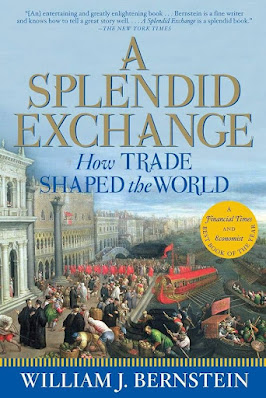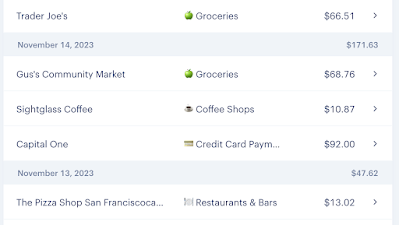Hot on the heels of "The Birth of Plenty", I've devoured "A Splendid Exchange", another book by William Bernstein on economic history. As is my wont, let's compare and contrast them!
"The Birth of Plenty" felt like a book that was written around a thesis, and used examples from history to demonstrate that its thesis was correct. On the other hand, "A Splendid Exchange" feels like a book that's primarily interested in telling stories from history, and then allowing observations from those examples to bubble up. It actually reminded quite a lot of Piketty's transition from Capital in the Twenty-First Century to Capital & Ideology, where the earlier book makes the argument that certain phenomena will occur whenever other preconditions arise, while the latter book looks at the many varied ways different cultures have behaved over time.
"A Splendid Exchange" tells the history of global trade, and it turns out, it's a very long history indeed. Bernstein starts with prehistoric evidence we have of tools, metals and decorative stones being moved far from their point of origin, showing that in addition to conquest and raiding there was also an innate drive to "truck and barter" in goods that's been with us from the beginning. Most trade was regional, but there was intercontinental trade over two millennia ago, when Chinese silks made their way to Rome. Romans had no idea that China existed; they got their silks from Asia Minor, which got them from Persia, which for them from India, which got them from the Moluccas, which got them from China. Roman silver coins made their way in the other direction, mysteriously appearing in the Far East.
One of Bernstein's overarching ideas is that, while we think of global trade is being a modern phenomenon that started after the Industrial Revolution, it has been with us for much longer than that, and it really hasn't changed all that much. We have faster and safer ships now, which brings down cargo cost and puts the price of goods within reach of people other than the Roman Emperor, but the overall system and drive is remarkably similar. (And, not to keep on comparing authors to one another, but that perspective also reminds me a lot of Neal Stephenson's view of currency, which is basically that nothing new has happened for hundreds of years and the systems set up under Isaac Newton are basically the same ones we're using today.)
There is definitely a rise and fall to global trade, and that Roman-Chinese silk trade is a great example: after the Pax Romana ended and the trading routes grew too dangerous to travel, the doors swung shut. China still made silks, but they no longer traveled all the way to Europe; Italians still mined gold and silver, but it stayed on the continent.
Islam plays a huge role during the book, dominating international trade for nearly a millennium. I thought Bernstein was much more complimentary of Islam in this book than he was in TBoP. In the earlier book, he examines why Muslim countries have so badly lagged Western countries, and concludes that it's due to cultural values driven by their religion: a distrust of scientific rationalism and a prohibition on paying or receiving interest on investments. In A Splendid Exchange, he focuses more on the positive aspects of Islam. He notes that it's the only major religion to be founded by a trader, and there's a higher esteem given to traders and merchants under Islam than, say, under Confucianism. He also notes how, for many centuries, the Islamic world was a beacon for scientific advances, with some centers like Baghdad particularly known for attracting scholars. Bernstein observes that the growth of Islam was in large part fueled by economics, and economics drove the further expansion of Islam: Muslims were allowed to raid and pillage non-Muslims, but couldn't raid other Muslims, which gave a strong incentive for nearby neighbors to convert; in doing so they joined a cooperative economic community of lighter taxation and access to markets across Europe, Africa, the middle-East, Asia and Indonesia.
So, what ends Islam's control over world trade? Mostly technology and guns. First the Portuguese, then the Dutch, then the British establish their own trading system, forcing their way into ancient entrepots and enabling single voyages from Asia to Europe without passing through the Red Sea or the Persian Gulf.
Perhaps even more so than with The Birth of Plenty, I thought a lot about Europa Universalis IV while reading this. The trading system in particular is really closely aligned with it and reflects how different nations profited from, say, the Spice Trade or Cloves over time. I found myself wondering whether Paradox was directly inspired by these books; but also, Bernstein relies on distilling the research from historians, economists and scientists in writing these books; it isn't like he's just making it up, so it makes sense that both these books and this grand strategy video game would reflect the same understanding of truth.
In EUIV, you will generally make income through some combination of the following:
1. Production; that is, the direct value of things you grow and produce.
2. Trade, which is based on the value of goods you export and your level of control over their distribution.
3. Conquest; directly pillaging enemy land and/or demanding tribute to end wars.
4. Directly mining gold.
#2 is pretty much always the best approach in the game. Production is decent, but if you cede control of trade to your neighbors, they will profit from your own production. Conquest and mining can give significant short-term boosts in revenue, but can spell the long-term death of your economy as they cause inflation to grow, so once you run out of rich neighbors to fight or your mines are depleted, you'll be far poorer than you would have been without conquering or mining to start with. In these books Bernstein shows how, say, Rome and Spain and other once-powerful empires were built on unsustainable expansion and that led to decay and collapse, while other nations like the Netherlands had outsized success and much more graceful declines once they were surpassed.
Back to the book: In Birth of Plenty, Bernstein has a laser-sharp focus on 1820 as a sort of magical year that separated the pre-modern world of stagnation with the modern world of endless growth. A Splendid Exchange portrays a much smoother and more gradual transition. We see how sailing technology gradually improved, thanks both to scientific discoveries and advances in engineering. Seemingly simple ideas like "Let's cut out some big chunks of ice and sell it!" opened up huge new markets for the export of fresh produce and meat; interestingly, sometimes those businesses started a generation or more after the technologies that enabled them. And while the telegraph was a huge advance in instantaneous communication, even the humble postage stamp was a huge jump forward in the de-facto ease and speed of communication.
Bernstein seems to have very strong opinions, but he also seems to let the data drive his conclusions. Overall he is extremely pro-free-trade and anti-tariff, and looks critically at the wave of protectionism that arose in the 19th century; but based on studies, he rejects the idea that protectionism caused or prolonged the Great Depression. (Though, as with Chernow's House of Morgan, he does believe that the one-two punch of reparations and tariffs after World War 1 directly led to World War 2, as the defeated Central Powers were unable to acquire the foreign exchange necessary to service their crushing debt.)
He sees everything through an economic lens, and so, for example, he sees the American Civil War as more of a result of trading factors than a moral crusade. The South favored free trade, as they wanted to export cotton to Britain, while the North favored protectionism, as they sought to grow their industrial base while keeping out superior British products. I'm personally skeptical that trade policy was the primary factor in sparking the war, but I can definitely understand how it would contribute to tensions.
Late in the book, Bernstein presents a really interesting and cool framework for analyzing trade disputes within and between nations. When two nations trade with one another, prices tend to normalize between them: so if Country A was selling bread for $1 a loaf, and Country B was selling bread for $5 a loaf, then after they open markets between them, bread will most likely grow more expensive in Country A (as they're exporting more of it and so there's less to sell) and less expensive in Country B (as they can import cheaper foreign bread, driving down the price local bakers can charge). Very crudely, consumers will benefit in County B and be hurt in Country A, while producers will benefit in Country A and be hurt in Country B. Bernstein argues, pretty convincingly, that opening up trade in this way will be a net benefit for the entire system, growing total wealth and lowering total costs; but some individuals will be greatly harmed in the process.
Bernstein identifies three groups of "scarce factors": land, labor and capital. There's no intrinsic link between these, and depending on a nation's natural resources, population, technology and other concerns, their allegiances can shift dramatically. For example, in the 1800s America had abundant land, but scarce labor and capital; Britain had abundant capital and labor, but scarce land; India had abundant land and labor, but scarce capital. So, it makes sense that in the 1800s America tended towards protectionism, benefiting domestic bankers and factory workers, while Britain promoted free trade, benefiting its own workers and financiers. British farmers were hurt by free trade, but only a tiny fraction of Englishmen were engaged in farming; in contrast, France employed a much higher share of its population in farming, and so their concerns were heeded more than on the other side of the Channel.
While he's very pro-Free-Trade, he cheerfully concedes near the end that trade is actually a relatively small factor in overall economic growth. The US was highly protectionist throughout the 19th century, yet had enormous growth. Since World War 2, trade has been an increasingly large factor for growth, but far from an unalloyed good.
The very end of the book covers much the same ground as the end of The Birth of Plenty: looking at the rise in income inequality (which was already evident when he wrote these books 15-20 years ago and has only accelerated since then), the poisonous effects that has on international amity and domestic social cohesion, and what to do about it. He makes a very vigorous case for a stereotypical Liberal program: unfettered private-sector free-market activity, including low tariffs, combined with redistributive taxation that compensates the "losers" with the excess wealth generated. That includes people like laid-off factory workers in America, poor craftspeople in Uganda, and so on. It's a very different approach than the more muscular Progressive economic policy proposals I've been focused on lately, but I can definitely see where Bernstein is coming from and his reasons to advocate for this approach.







